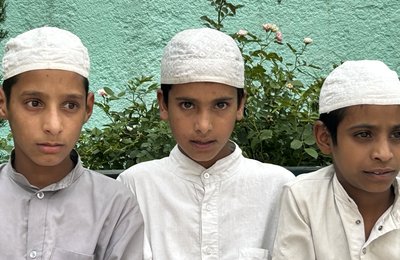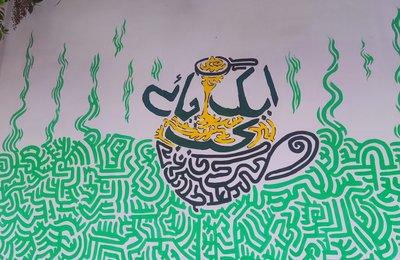Forced silence: when Congolese activists become targets
This article highlights the targeting of activists in DRC, which has increased since M23 captured Goma.

In the verdant mountains and fertile valleys of the eastern Democratic Republic of Congo, a dull sound has been echoing for several months: the sound of weapons, muffled cries and enforced silences. The region, already battered by decades of armed conflict, is now experiencing renewed violence, aggravated by the resurgence of the M23 and the increased activism of other armed groups.
But this war is no longer just about territory or natural resources. It now targets voices. Those of young activists, committed artists, journalists in the field, human rights and environmental defenders. It wants to silence them.
In this chaotic landscape, fighting for social and environmental justice becomes an almost suicidal risk. The slightest word too many in the media, a report on abuses, an artistic work deemed too daring or a simple appeal to the courts can be enough to sign one's death warrant.
In recent years, but especially between January and March 2025, several civil resistance figures have been forced to flee the country in a hurry. Threatened, harassed, some arrested, others murdered. Many found refuge in neighbouring countries such as Tanzania, Kenya, Uganda and Burundi. Others live in hiding, clandestinely, in areas they hope are still safe.
The brutal murder of artist Delcat Idengo, shot dead in the middle of the day in Goma, has sent shockwaves. He was killed on February 13, 2025, by suspected M23 fighters, despite having repeatedly denounced the actions of the Rwandan-backed M23 in the region in his political songs. The exact circumstances of his murder remain unclear, but several local sources suggest that this committed and much-followed artist was shot dead. Known for his works denouncing war and corruption, Delcat was more than a musician. He was a voice of hope and truth.
A LUCHA (Pro-democracy citizens' movement) activist told RFI (Radio France Internationale) that the murder sends a disturbing message to all voices of dissent.
According to him, “it's because he dared to peacefully question, through his art, through his talent, through his voice, the military orientations of the M23 and all the crimes they commit against civilians that, unfortunately, he was shot dead. And that's unacceptable.”
But Delcat Idengo's death is just one example among many. Since then, several activists have received anonymous calls, worrying messages and even nocturnal visits that leave no doubt: their lives are in danger. Not only because of armed groups, but also because the current political system under President Felix Tshisekedi considers any independent voice a threat to his power.
A Human Rights Watch report notes that “the M23 has long used threats and intimidation to restrict the population's access to information and stifle critical voices”. And since the capture of Goma at the end of January, followed by Bukavu in February, pressure on activists and journalists by the M23 rebels has multiplied.
Clémentine de Montjoye, researcher in the Africa division of Human Rights Watch, is keen to point out that, before the M23 arrived in these towns, the situation was far from perfect, particularly for journalists. “Many of them faced pressure and threats from the Congolese authorities, who sought to control the way they covered the conflict”, she explained on Radio France Internationale.
I, too, speak here not as an outside observer but as a direct witness, for I too had to flee. After being repeatedly threatened on my phone, I had to leave the city of Goma in a hurry in February 2025, a few days after it had been partially occupied by the M23 rebels. My commitment to social and environmental justice, which I pursue through community initiatives and podcasts, has exposed me.
As founder of Jambo Radio, a community and indigenous media outlet, I told the story of what others preferred to hide: abuses committed against local and indigenous communities, violations of land rights, pollution of rivers by mining companies, illegal logging of classified forests, and so on.
Today, in exile, my voice may carry further, but it is also more vulnerable. Like me, dozens of other exiled activists are struggling to rebuild their lives. Far from their loved ones, without stability or protection, they survive. But they don't give up. From our precarious shelters, we continue to denounce, document and raise awareness. Because we know that silence is complicity, and we refuse to let the executioners write history alone.
What we are asking for today is not just individual protection. We are calling for recognition of the vital role played by local defenders in peacebuilding, in the fight against environmental abuse, in the defence of human dignity. We call for emergency support mechanisms, greater international solidarity, and real legal and political protection. We also call on the international community to stop looking away from the tragedies in the DRC.
It is time for African and international institutions to set up monitoring and transnational justice systems, so that the crimes committed in the DRC do not go unpunished. We need a special war crimes tribunal, a transitional justice mechanism capable of healing the wounds, making the voices of the victims heard and holding the perpetrators to account. For this forced silence is a direct attack on democracy, on freedom of expression, and on the right to dream of a different future for our country.
In my region today, blood continues to flow, fear reigns, but resistance is getting organised. We are many, scattered perhaps, but united by a common conviction: the truth must come out, justice must triumph. It's time to listen to those who have been silenced. For as long as we live, we will continue to speak. To write. To resist.








